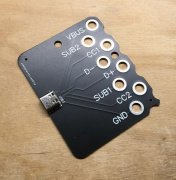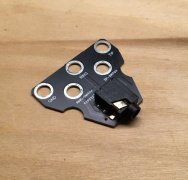miniTesla: build electronics and more

miniTesla is a new solderless electronic building system that is mechanically much more sturdy than the common breadboard while at the same time also allowing the use of standard unmodified common electronic components creating a low-cost solution. On top, it mechanically connects with Lego and goBilda.
Another advantage of miniTesla is that circuits can be built in the shape they are drawn, reinforcing circuit patterns and thus amplifying the learning process. Due to the mechanical integrity of the system circuits can be used long-term in projects or kept as a reference which is very convenient for teaching.
If you have been annoyed by unreliable breadboards, and the mess of wires they often produce, give miniTesla a try. You will like it. For further details refer to our free manual or browse the various kits, components, and circuit ebooks we have to offer.
This new mechatronic interface to printed circuit boards makes it very easy to connect to other popular platforms such as Raspberry Pi, Arduino, or Lego.
miniTesla offers, for a solderless system, superior mechanic and electric connectivity and reliability together with low component cost.
Subtopics
Projects & Circuits Connectors & Sockets Components Traces Solder Yourself Lego kitsAuthors
Products
The Magic Switchboard and other Deceptive Lights and Switches
Chris Wasshuber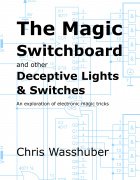
An exploration of electronic magic tricks.
Magicians have always incorporated the latest technologies into their miracles. Electronics is no exception. This ebook deals with effects that use lights and switches in deceptive ways. The Magic Switchboard effect with four switches and four lights is the most well-known of them, but there are others. Electronics is at the heart of their methods.
Little has been published about these effects in the past. One can find bits and pieces in the magic literature, but most of the necessary information to understand these tricks has not been released...
Arduboy
Kevin Bates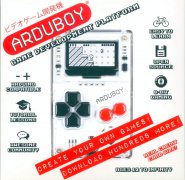
Create your own games, and download hundreds more.
Arduboy is a credit card-sized 8-bit gaming console and game development platform. It is easy to learn, open source, and suitable for ages 12 and up.
It comes loaded with several games. More games can be loaded onto it, but the real fun is making your own games. It has very good community support and lots of games to explore.
This is a brand new original Arduboy (not the later FX version). It comes in the original package with a USB cable.
- Learn computer science skills & programming in C++ from tutorials
- Get guidance from experienced...
LEDs
miniTesla
Each board has an LED and an 820-Ohm resistor in series to protect the LED from over-currents. The color of the board reflects the color of the LED for quick identification. An LED symbol is printed on the front and back to identify the orientation of the LED. You will get two blue LEDs and two white LEDs.
We are providing these merely for convenience. Regular LEDs with leads can be used with miniTesla without any alterations. However, these LED boards allow a more compact and neater build when LEDs are needed.
SOIC-8, 14, 16 boards
miniTesla
These are PCBs that allow you to incorporate ICs in a SOIC (Small Outline IC) package into a miniTesla project. You will be able to solder such ICs onto these PCBs. Some ICs are no longer being manufactured in DIP (Dual In-line Package). You will get two boards for 8-pin SOIC, two boards for 14-pin SOIC, and two boards for 16-pin SOIC.
They all have a place where one can solder an SMD decoupling capacitor. The capacitor pads are connected with pins 4/8 for SOIC-8, pins 7/14 for SOIC-14, and pins 8/16 for SOIC-16. The 8- and 14-pin boards have pads for a second capacitor that is connected...
RPi Pico Test Lab and PicoBasic
Burkhard Kainka
The Rpi Pico Test Lab explains how to turn a regular Raspberry Pi Pico into a complete testing and measuring environment including measuring devices, plotters and oscilloscopes as well as control over eight digital inputs and outputs, three analog inputs and two PWM outputs for power control or for providing adjustable DC voltages.
One of the problems for somebody who would like to get into electronics is purchasing all the necessary testing equipment such as a multimeter, oscilloscope, function generator, variable power supply, component testers, etc. This starts to get expensive. This...
Raspberry Pi Pico breakout board
miniTesla
With this breakout board, it is very easy to integrate a Raspberry Pi Pico microcontroller into your miniTesla project. Simply snap an RPI Pico without any soldered headers into the Clipzin socket. A reset button is already on the board, as is a 4-pin female header connected to the default I2S channel with four connections (GND, 3.3V, SCL, SDA). You can, for example, plug a small OLED screen into this header.
This board does not include an RPi Pico.
Why not get this Pico breakout board to build your own Test Lab that includes all the important testing equipment an electronics lab needs: multimeter,...
BNC Connector
miniTesla
A BNC connector is one common choice to connect a coaxial cable. It is often used in lab setups because the connection can be established or broken with one quick turn of the hand.
Because there are pins and wires protruding at the underside of the PCB, you can only use this sub-board at the edge of the pegboard. See the additional photos.
Rotary Encoder
miniTesla
This is an incremental rotary encoder with a push button. It includes a plastic knob. Pressing on the knob activates a momentary switch. Rotating the knob creates the gray code signals at the outputs A, B, and C that allow you to determine the direction of the rotation as well as how far it has been turned.
These encoders are great for selecting among various possibilities. For example, they are often used to navigate through a multilevel menu. Rotating the knob moves you up and down a list of menu items, and pressing the knob selects the item and moves you one level lower in the menu.
Screw Terminal Block
miniTesla
Screw terminals are very useful for all kinds of applications. They can be used to connect wire antennas, and are convenient in combination with Lego Technic pieces to connect the ends of coils wound on Lego coil formers. See the manual for further details.
Set of 30 traces
miniTesla
A set of 30 traces for the miniTesla prototyping system. These connections can be put either directly below or above the pegboard and are mechanically secured as well as electrically connected with our spring contacts. You will get two of each kind. Included are:
- 2x 9 holes long
- 2x 8 holes long
- 2x 7 holes long
- 2x 6 holes long
- 2x 5 holes long
- 2x 4 holes long
- 2x 3 holes long
- 2x 2 holes long
- 2x 3 holes in triangle configuration
- 2x 2 holes + diagonal on one end (L-shape)
- 2x 3 holes + diagonal on one end (L-shape)
- 2x 4 holes + diagonal on one end (L-shape)
- 2x 5 holes + diagonal on one end (L-shape)
- 2x 2...
Transistor Socket
miniTesla
Transistors can be incorporated into the miniTesla system without a socket. You bend the legs to the side and clamp them at the top of the spring contacts (see the manual for instructions). However, a more convenient way is to use this socket. It is a small female header with a hole spacing of 1.27 mm (0.05") arranged in two rows with 5 contacts each. The outer four contacts on each side are electrically connected, as are the two middle contacts. This allows you to insert transistors with leads spaced at 2.54 mm (0.1") or spaced at 1.27 mm (0.05").
14-pin DIP
miniTeslaExperiments with miniTesla
Burkhard Kainka & Chris Wasshuber
These are the instructions for the Starter Kit. Each Starter Kit already includes a printed copy. This ebook edition is meant for those who want to source components independently or merely want to see the circuits.
- The miniTesla System
- Components
- Resistors and Capacitors
- Potentiometer
- IC Socket
- 1. Operational Amplifier
- 1.1 First Test
- 1.2 Touch Sensor
- 1.3 Run-on Control
- 1.4 Flashlight
- 1.5 Adjustable Flash Length
- 1.6 Light Sensor
- 1.7 Time Delay
- 1.8 Push-Pull Light Sensor
- 1.9 Brightness Comparison
- 1.10 Twilight Switch
- 1.11 Temperature Sensor
- 1.12 Temperature Comparison
- 1.13 LED...
Experimente mit miniTesla (German)
Burkhard Kainka & Chris Wasshuber
Das ist die deutsche Anleitung zum Starter Kit mit allen 47 Schaltungen und Aufbauzeichnungen. Diese Ausgabe ist für diejenigen gedacht die sich selber die notwendigen Bauteile besorgen bzw. nur die Schaltungen sehen wollen.
- Das miniTesla System
- Bauteile
- Widerstände und Kondensatoren
- Potentiometer
- IC Sockel
- 1. Operationsverstärker
- 1.1 Erster Test
- 1.2 Berührungssensor
- 1.3 Nachlaufsteuerung
- 1.4 Blitzlicht
- 1.5 Einstellbare Blitzlänge
- 1.6 Lichtsensor
- 1.7 Zeitverzögerung
- 1.8 Gegentakt-Lichtsensor
- 1.9 Helligkeitsvergleich
- 1.10 Dämmerungsschalter
- 1.11 Temperatursensor
- 1.12 Temperaturvergleich ...
miniTesla Starter Kit
miniTesla
This is the Starter Kit for the miniTesla solderless electronic building system. It has over 100 components and a printed instruction booklet with 47 experiments. It includes all the necessary tools and components to complete each circuit. You only need to supply a 9V battery.
In this Starter Kit, we teach electronics by circuit examples rather than the traditional math-heavy approach. In fact, there is no math in the instruction book. We immediately start with small but interesting circuits and short explanations of how they work. This encourages experimentation and emphasizes a playful...
Magic with Electronics
Julio Caso de los Cobos Fidalgo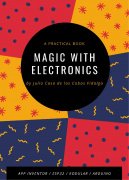
This ebook is for all who would like to combine magic and electronics but have little experience with electronics and have no idea what the possibilities are. The author explains a range of projects that will give you an overview of some of the magic effects achievable with electronics.
The first project has nothing to do with electronics but it will teach you how to write software, an app for your mobile phone. It is a very simple app, and it will not make you a programmer, but it allows you to get your feet wet and get a glimpse at the possibilities of apps.
You will then be introduced...
More Magic with Electronics
E. W. Bud Morris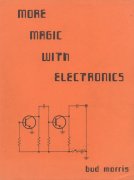
- "S.O.S." Triangle
- Dance Of Death
- How's Your Bird?
- The Tattle-Tale Heart
- Return To Boggart’s Inn
- The Laughing Skull
- Train To Nowhere
- A.K. Cassette - Improved
- Electronics In Mentalism
- Source Section
- Final After-Thoughts
Note that this digital edition does not include the reprint of the first volume. The first volume is available separately here.
1st edition 1975, 59 pages; PDF 54 pages.
Magie und Elektronik
Georg Stark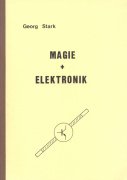
Elektronische Zauberkunststücke aus den Bereichen Mikro-, Salon- und Mentalmagie.
- Zauberstab mit Glühzünder
- Die Stanleykassette
- Die Edison-Box
- Salzstreuer mit Musik
- Pirouett
- Mein Karten-Roboter
- Tuch durch Kerzenflamme
- Vom Devano- zum Förderband-Kartensteiger
- Gedankenübertragung mit Disco-Antenne
- Elektronischer Würfel
- Riesenpointkarten Mental
- Lügendetektor
Erstausgabe 1986, 31 Seiten; PDF 33 Seiten.
150 Best Circuits
Burkhard Kainka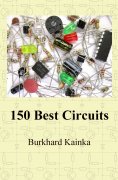
150 very useful circuits that have stood the test of time, grouped under 32 application topics.
Burkhard Kainka has for decades developed and designed electronic circuits and projects for Franzis, Elektor, Kosmos, and Modul-Bus. Some of these circuits have stood the test of time and Kainka is returning and using them again and again. 150 of these best and most useful electronic circuits are collected in this ebook.
The focus is on circuit technology with discrete semiconductors and common standard ICs such as operational amplifiers and the NE555 timer chips. The areas of radio technology...
8-pin DIP
miniTesla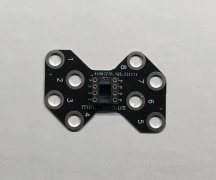
Some of the most popular chips come in 8-pin, arranged as 2 rows of 4 pins, DIP packaging. Think about the famous 555 timer chip or dual-operational amplifiers such as the LM358. You can also find comparators (LM393) and audio amplifiers (LM386). You can put two optocouplers (PC817) into the socket. Some microcontrollers such as the ATtiny85, PIC12F1840, or PICAXE-08M2 also fit. There are H-bridges to control motors (L9110), tone decoders (LM567) that can also be used to demodulate AM and FM signals, and a lot more.
You are not limited to only inserting integrated circuits. Other component...
Side-Effects of Electronics
Burkhard Kainka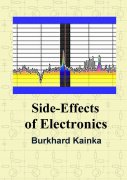
Exploiting little-known characteristics of electronic components.
Did you know that an LED can also work as a light sensor or solar cell? That a photodiode can also detect radioactivity? That you can build a microphone from sugar? That a capacitor can 'magically' re-charge itself after it has been fully discharged?
Kainka explains these and other strange and uncommon characteristics of electronic components. Everything is explained in a hands-on style with photos, circuit schematics, measurement results, and explanations of how these phenomena come about and manifest themselves.
This...
Magie Magnete Motoren
Herbert-Martin Paufler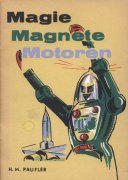
Paufler, von Beruf Ingenieur, war ein Meister der szenischen Mikromagie. Er war einer der Ersten die Elektronik in die Methodik der Zauberkunst einfließen ließen. Diese Publikation ist daher eine der wenigen Zauberpublikationen in denen man elektronische Schaltungsdiagramme findet. Für den Elektronikbegeisternden ist es eine wahre Schatztruhe.
Auszug aus dem Vorwort von Hans Marian:
Dieses Buch ist magisches Neuland! Sein Wert wird wahrscheinlich erst nach Jahren oder gar Jahrzehnten voll erkannt und gewürdigt werden, denn es eilt mit seinen genialen Grundideen der Zeit weit voraus....
Rotary Switch 1-out-of-9
miniTesla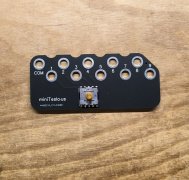
This rotary switch connects a common (COM) pin with one out of 9 pins. This is a through-hole component; thus, this sub-board can only be used on the edge of a pegboard, either immediately above or below the pegboard, unless you drill additional holes into the pegboard.
The knob has a 4 mm diameter and a D-shape.
Momentary Pushbutton
miniTesla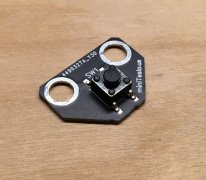
A momentary pushbutton. It connects the two pins only as long as the button is pressed.
It is easy to build a pushbutton from miniTesla traces and some hardware (screws, washers) - see the manual - but this assembly allows smaller and more convenient building.
Toggle Switch
miniTesla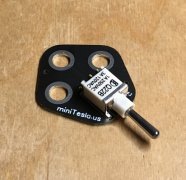
Our toggle switch has three positions: left, middle, and right. The left switch position connects the middle pin to the left pin. The middle is a neutral position where the middle pin is not connected to anything. In the right position, the middle pin is connected to the right pin. You can use this toggle switch as a simple on-off switch or as a selector between two alternatives.
Toggle switches can also be built in combination with Lego. See the manual for ideas.
2.1 mm Female Barrel Connector
miniTesla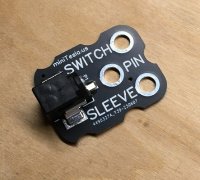
The most widely used barrel connector is the 2.1 mm one. They are often used for low-voltage power supplies and wall adaptors. You will probably have several of these lying around from old or broken toys and other equipment. They make great power supplies for various projects. This sub-board allows you to easily connect them to the miniTesla system.
This one has a plug insertion detection, a switch that is closed and thus connected to the sleeve if no plug is inserted. Once a plug is inserted this switch opens. This is useful to automatically switch between battery operation, when no plug...
10k Ohm Potentiometer with Pushbutton
miniTesla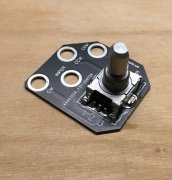
A potentiometer, or variable resistor, with three pins labeled CW, CCW, and wiper. The wiper moves between the CW (clockwise) and CCW (counterclockwise) endpoints and therefore the resistance between the wiper and the endpoints changes with the position of the potentiometer. The resistance between CW and CWW is a constant 10k Ohm.
Additionally, this potentiometer has a built-in momentary pushbutton by pressing down on the dial. When pressed the SW1 and SW2 pins are connected.
Lego pegboard kit
miniTesla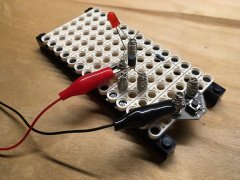
This kit allows you to build a little pegboard that works nicely together with our spring contacts and sub-boards to construct electronic circuits on it. It is a neat way to incorporate electronics into your Lego project without having to use premade electronic modules.
The kit includes the following parts:
- 2 pieces of Lego 1 x 16 bricks
- 14 pieces of white Lego technic 7 x 1 half-height (thin) beams
miniTesla Pegboard
miniTesla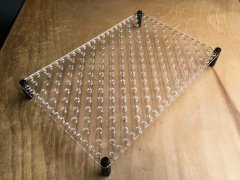
This pegboard is 192 mm x 128 mm (7.6" x 5") large which is a bit smaller than half letter size and made from clear 1/8" thick acrylic. Additionally, you will receive four M4x20 mm long hex spacers made from nylon and four M4 matching nylon screws. These spacers function as feet for the board.
The board has 230 holes to accept our spring contacts and it can be mechanically linked to Lego bricks and Lego technic components. In the Lego raster, it is 16 x 24 large. Its shorter side is exactly half the length of a Lego baseplate which is 32 x 32.
Please see the free miniTesla manual for details on how this electronic...
Spring Contact Compression Tool
miniTesla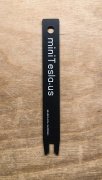 This tool is perfect to compress the miniTesla contacts to connect wires to it. Please refer to the miniTesla manual for details.
This tool is perfect to compress the miniTesla contacts to connect wires to it. Please refer to the miniTesla manual for details.
Spring Contact (Package of 20)
miniTesla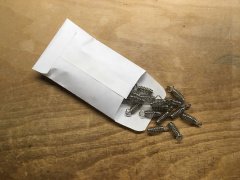
These are the crucial miniTesla spring contacts. They are the connecting elements that allow mechanical as well as electrical connection of electric components. This package includes 20 of them.
They are inserted in 5 mm holes of pegboards about 1/8" (~3 mm) thick. They can be inserted and removed with your fingers but a better removal tool is a 1.75 mm (No. 0) crochet hook. Please refer to the manual for details.
To clamp wires use your fingers or our compression tool.
These spring contacts also fit perfectly into half-height (thin) Lego technic beams. One can construct a little pegboard purely from thin Lego...
miniTesla Manual
Chris Wasshuber
This is the getting started guide for the miniTesla solderless electronic prototyping system. Learn the basics of how to build, develop, test, and disassemble circuits, and how to mechanically connect them to the world of Lego.
miniTesla is a new electronics prototyping system based on an ingenious spring contact originally developed by Philips in the 1960s. This contact provides mechanic as well as electric connectivity. We have further improved the original system by eliminating the need for carrier boards for discrete transistors, and by adding additional ways to connect components providing three...
Magic with Electronics
E. W. Bud Morris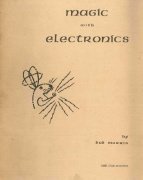
Bud Morris had a creative mind. In this collection of effects he demonstrates how a bit of electronics allows you to perform miracles and entertain your audience.
- Bud Morris … Who's He?
- The Brain Wave Lamp
- Oriental Caddy
- Way Out-Er Limits
- E.S.P. And The Joker Is Wild!
- Mystic Black Ball
- Remote Control Table
- The Wheel Of Thought
- Skull-Duggery
- Electronic Equipment
Electronic Buzz Box
Dave Arch
Although you can find versions of these Electronic Monte boxes for sale on magic websites, I could not find one large enough for my needs nor one that included a buzzer (not just a light). So I built my own. In spite of the fact that my electronic knowledge only involves the ability to insert a plug into an outlet, I built my own the first time in under an hour for around $20.
The premise is simple. From among multiple buttons, you win if you can find the button that lights the light and sets off the buzzer. With the diagram included in my instructions you aren't limited to only three buttons...
Miracles of Modern Magic
Claude Klingsor
For me personally these lecture notes have been a real treat - something I enjoyed tremendously reading and getting my creative juices flowing. This is an ebook on enabling miracles with electronics. Magicians have always used the latest technology to create their wonders. Claude Klingsor from Belgium has specialized in using electronics to create miracles.
This is a magic ebook for engineers, inventors and tinkerers. The fact that these notes were written in the late 80s means that you won't find any microcontrollers, but that is also the charm of this ebook. The circuits are very easy to...



























